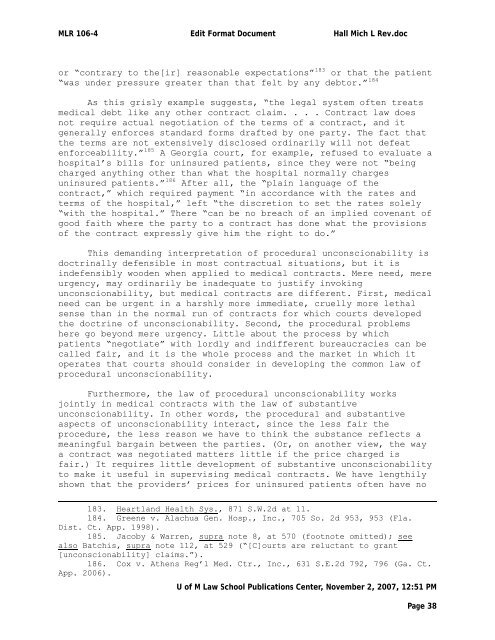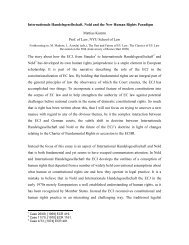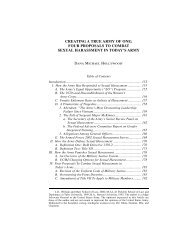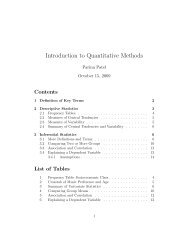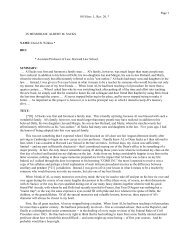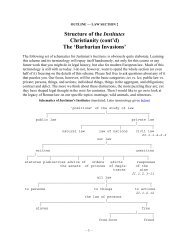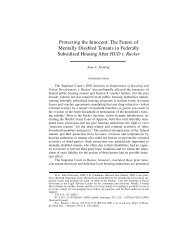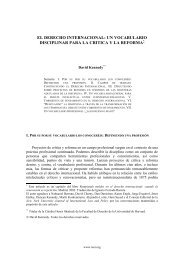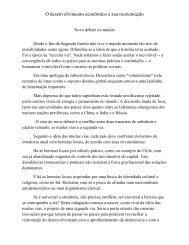Patients as Consumers - Harvard Law School
Patients as Consumers - Harvard Law School
Patients as Consumers - Harvard Law School
You also want an ePaper? Increase the reach of your titles
YUMPU automatically turns print PDFs into web optimized ePapers that Google loves.
MLR 106-4 Edit Format Document Hall Mich L Rev.doc<br />
or “contrary to the[ir] re<strong>as</strong>onable expectations” 183 or that the patient<br />
“w<strong>as</strong> under pressure greater than that felt by any debtor.” 184<br />
As this grisly example suggests, “the legal system often treats<br />
medical debt like any other contract claim. . . . Contract law does<br />
not require actual negotiation of the terms of a contract, and it<br />
generally enforces standard forms drafted by one party. The fact that<br />
the terms are not extensively disclosed ordinarily will not defeat<br />
enforceability.” 185 A Georgia court, for example, refused to evaluate a<br />
hospital’s bills for uninsured patients, since they were not “being<br />
charged anything other than what the hospital normally charges<br />
uninsured patients.” 186 After all, the “plain language of the<br />
contract,” which required payment “in accordance with the rates and<br />
terms of the hospital,” left “the discretion to set the rates solely<br />
“with the hospital.” There “can be no breach of an implied covenant of<br />
good faith where the party to a contract h<strong>as</strong> done what the provisions<br />
of the contract expressly give him the right to do.”<br />
This demanding interpretation of procedural unconscionability is<br />
doctrinally defensible in most contractual situations, but it is<br />
indefensibly wooden when applied to medical contracts. Mere need, mere<br />
urgency, may ordinarily be inadequate to justify invoking<br />
unconscionability, but medical contracts are different. First, medical<br />
need can be urgent in a harshly more immediate, cruelly more lethal<br />
sense than in the normal run of contracts for which courts developed<br />
the doctrine of unconscionability. Second, the procedural problems<br />
here go beyond mere urgency. Little about the process by which<br />
patients “negotiate” with lordly and indifferent bureaucracies can be<br />
called fair, and it is the whole process and the market in which it<br />
operates that courts should consider in developing the common law of<br />
procedural unconscionability.<br />
Furthermore, the law of procedural unconscionability works<br />
jointly in medical contracts with the law of substantive<br />
unconscionability. In other words, the procedural and substantive<br />
<strong>as</strong>pects of unconscionability interact, since the less fair the<br />
procedure, the less re<strong>as</strong>on we have to think the substance reflects a<br />
meaningful bargain between the parties. (Or, on another view, the way<br />
a contract w<strong>as</strong> negotiated matters little if the price charged is<br />
fair.) It requires little development of substantive unconscionability<br />
to make it useful in supervising medical contracts. We have lengthily<br />
shown that the providers’ prices for uninsured patients often have no<br />
183. Heartland Health Sys., 871 S.W.2d at 11.<br />
184. Greene v. Alachua Gen. Hosp., Inc., 705 So. 2d 953, 953 (Fla.<br />
Dist. Ct. App. 1998).<br />
185. Jacoby & Warren, supra note 8, at 570 (footnote omitted); see<br />
also Batchis, supra note 112, at 529 (“[C]ourts are reluctant to grant<br />
[unconscionability] claims.”).<br />
186. Cox v. Athens Reg’l Med. Ctr., Inc., 631 S.E.2d 792, 796 (Ga. Ct.<br />
App. 2006).<br />
U of M <strong>Law</strong> <strong>School</strong> Publications Center, November 2, 2007, 12:51 PM<br />
Page 38


